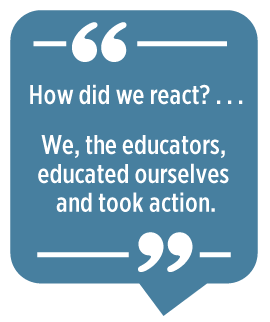From the President: Back to School With Knowledge and Confidence
by Deborah J. Short
 “School days, school days,
Dear old golden rule days, Reading, and writing and
‘rithmetic…”
“School days, school days,
Dear old golden rule days, Reading, and writing and
‘rithmetic…”
I’m not sure
any of us had the idyllic primary school experience evoked in this traditional
song, but at this moment, we might wish for a simple approach to education.
Life has been complicated.
I won’t
dwell on all the crises we have experienced since the start of this year—you
know them well. But I do want to acknowledge that we are making progress. We
are pulling together and supporting each other through
- the coronavirus pandemic
and public health crisis;
- the economic downturn and
ongoing budget concerns;
- the closing of schools,
universities, and language programs and their uncertain reopening;
- the Black Lives Matter
protests and the need to end systemic racism; and
- the isolation and the
stress resulting from all of the above.
I would
rather celebrate our successes. We have faced the difficult times with grace
and perseverance. We have shown our grit and ingenuity. We have accomplished
feats we never imagined 6 months ago.
Celebrate
Success
Think about
life in February and March. Were you ready for remote teaching and online
meetings 100% of the time? I wasn’t, and I expect many of you weren’t, either.
The pandemic closures gave new meaning to multitasking, didn’t it?
How did we
react? After the initial shock, we stepped up. We kept calm and carried on. We,
the educators, educated ourselves and took action.
-
We pivoted to remote teaching, learning
to teach with online platforms and tech apps.
-
We
advocated for our English learners, making sure they had devices, internet
access, food, and instructional supports.
-
We
took precautions to keep healthy, physically and mentally.
-
We
targeted the socioemotional well-being of our learners, in addition to their
academic needs.
-
We
explored professional learning options for ourselves.
-
We
collaborated with other English language teachers around the world.
In July, we
held the first-ever TESOL Virtual
Convention, and it was a hit! We had more than 3,900 registrants from
95 countries, four keynotes, close to 100 sessions, a virtual expo hall with more
than 35 exhibitors, and many networking sessions. This event paves the way for
more virtual conferences as well as a hybrid Convention with face-to-face and
online sessions in Houston next March. For those who registered for the TESOL
2020 Virtual Convention, remember that all the sessions were recorded and you
have access to them until mid-September. What a marvelous way to continue your
own professional growth at your leisure.
 The other
collaborations and innovations that our members shared over the past 6 months
have also been captured. As you prepare for the return to school, you can watch
TESOL International Association webinars on topics such as tips for teaching
online, using digital tools, working remotely with students who have disabilities,
applying antiracist and translingual teaching practices in writing lessons,
building affiliate leaders, and much, much more. Members of our interest
sections, professional councils, and affiliates are among those who have
contributed to these webinars. They are available on our TESOL International
Association YouTube channel.
The other
collaborations and innovations that our members shared over the past 6 months
have also been captured. As you prepare for the return to school, you can watch
TESOL International Association webinars on topics such as tips for teaching
online, using digital tools, working remotely with students who have disabilities,
applying antiracist and translingual teaching practices in writing lessons,
building affiliate leaders, and much, much more. Members of our interest
sections, professional councils, and affiliates are among those who have
contributed to these webinars. They are available on our TESOL International
Association YouTube channel.
I know that
we’ve mentioned the COVID-19
Resources before, but as you focus on planning instruction more
deliberately, you may want to peruse these again. And do sign up for the myTESOL
COVID-19 Community to share your ideas, get answers to your
questions, and engage with others who are experiencing similar
situations.
I hope you
check out all these resources, including the excellent set of “back to school”
articles in this edition of the newsletter, because they are the cumulation of
our success in moving forward during these dire times.
Be Ready for the Near
Future
As of this
writing, among the ten largest school districts in the United States, four plan
to begin the year with remote learning, one with a hybrid model combining some
in-person and some remote, three are undecided, and two will have full
in-person school available for all students (Education
Week, 2020). Those two, however, are in Florida, where the teacher
union is suing the state government to stop its mandate for in-person schooling
unless class size is reduced and teachers have adequate protective supplies
(Zapotosky, 2020). The data change weekly as virus outbreaks grow or recede. Stay tuned is the main message.
We don’t
have a crystal ball and can’t predict the future. What we do know is that we
have learned and collaborated and advocated in the past few months so that we
can return to teaching and do it better. We are teachers because we love the
profession, and whether we will be delivering instruction remotely or
face-to-face, that love of teaching will prevail. Have confidence that we will
keep language learning alive.
References
Education Week.
(2020, July 15). School districts’ reopening plans: A snapshot. https://www.edweek.org/ew/section/multimedia/school-districts-reopening-plans-a-snapshot.html?cmp=eml-enl-eu-news2-rm&M=59623114&U=19397&UUID=30189420a6ce9a547726207c24f82d4e
Zapotosky, M. (2020, July 20).
Florida teachers union sues over return to in-person classes, as debate over
school during the pandemic intensifies. The Washington
Post. https://www.washingtonpost.com/politics/florida-teachers-union-sues-over-return-to-in-person-classes-as-debate-over-school-during-the-pandemic-intensifies/2020/07/20/e3376ba8-ca9c-11ea-b0e3-d55bda07d66a_story.html
Deborah J. Short, PhD, is TESOL International Association president (2020–2021). She directs Academic Language Research & Training, LLC and provides professional development on academic literacy, content-based ESL, and sheltered instruction worldwide. She has led numerous research projects related to English learner education, codeveloped the SIOP Model, and served as series editor for several 6 Principles books.
TESOL Blogs
Interested in writing a blog for TESOL?
Read the submission guidelines and send us your post!
Check out some of the most recent TESOL Blogs:
|
5 Helpful Apps for Remote ELT Collaboration, by Stephanie Marcotte

Collaboration is vital to teaching and learning. Before COVID-19, collaboration might have happened at the copy machine, in the hallway, or in department meetings. Things changed last spring with the onset and spread of COVID-19. During this time, we had to respond and act quickly.
Now, we all face uncertainty with our back-to-school plans for the fall. It is more important than ever that we find new (and sustainable) ways to help facilitate our collaboration with each other regardless of whether we are online, remote, in-person, or using a unique hybrid. This is our time to move from the defensive of managing a crisis to the offensive!
This blog provides five apps that can help you collaborate with other teachers, colleagues, community members, and even parents during the fall semester and beyond. Whether you are working remotely or teaching in-person, these are helpful tools that can keep your lessons, projects, and priorities moving in a positive and sustainable direction. Read more. |
|
3 Online Whiteboard Speaking Games, by A. C. Kemp

Many of us are now teaching online, and it can be challenging to find ways to engage students who are sitting in front of a computer all day. How can we get students talking with the enthusiasm they have in the physical classroom?
One solution is to take advantage of virtual whiteboards for fun, descriptive activities that help students improve their speaking skills. This post explains technical requirements and provides instructions for three whiteboard games: 1) Moving Pictures (beginner), 2) What’s the Difference? (intermediate) and 3) Picture This! (advanced). Read more. |
|
2020 Census: What Families of ELs Need to Know, by Judie Haynes

The goal of the 2020 Census is to count everyone who lives in the United States. The information gathered by the Census provide statistics that affect funding for K–12 education and other community initiatives for the next 10 years. The statistics from the 2020 Census help determine how hundreds of billions of dollars in federal funding is given to communities. Because 60% of English learners (ELs) in the United States live in poverty, this affects them both in their schools and in their communities. Here are some educational and community resources that are funded: Read more. |